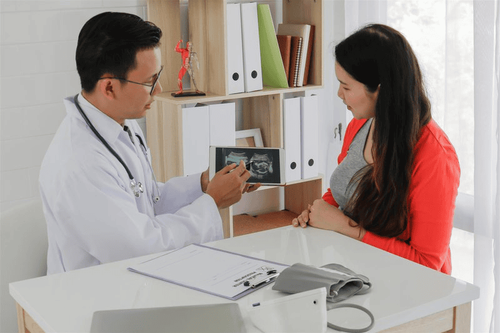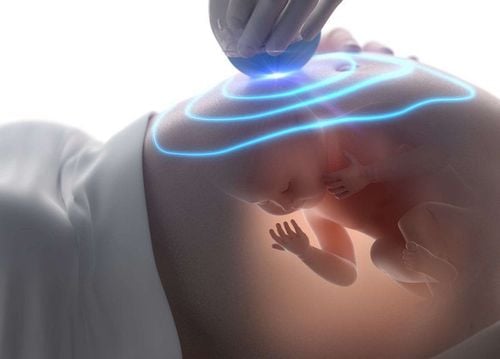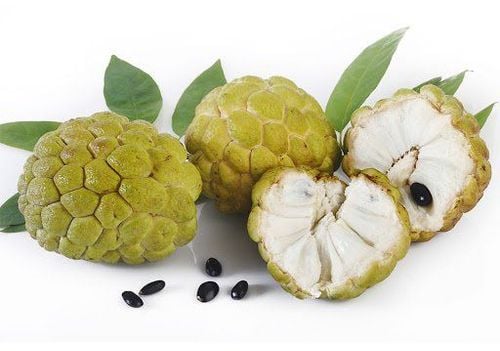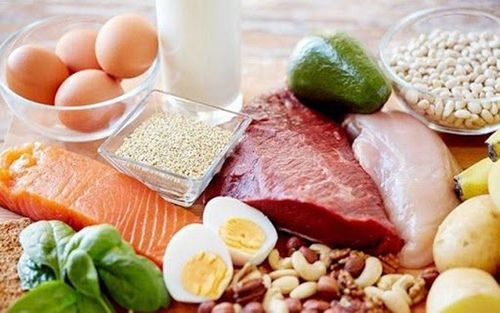This is an automatically translated article.
Pregnant women need to ensure a diet that provides adequate nutrients and energy sources for the fetus to develop and grow healthily. A healthy diet should include plenty of vegetables, fruits, whole grains, lean protein, and healthy fats. However, not everyone knows which specific vegetables or fruits to choose to benefit pregnancy.
1. Diet during pregnancy
To have a healthy pregnancy, pregnant women need to follow a balanced and nutritious diet. This involves the right balance between the nutrient groups, including carbohydrates, proteins and fats, and regularly consuming healthy plants like vegetables and fruits.
For pregnant women, before implementing any diet plan, you should talk to your doctor to get the correct and safe advice. The reason is, entering the stage of pregnancy, the amount of calories in the mother's body will tend to increase. At most, their calorie consumption will only increase by a few hundred calories per day.
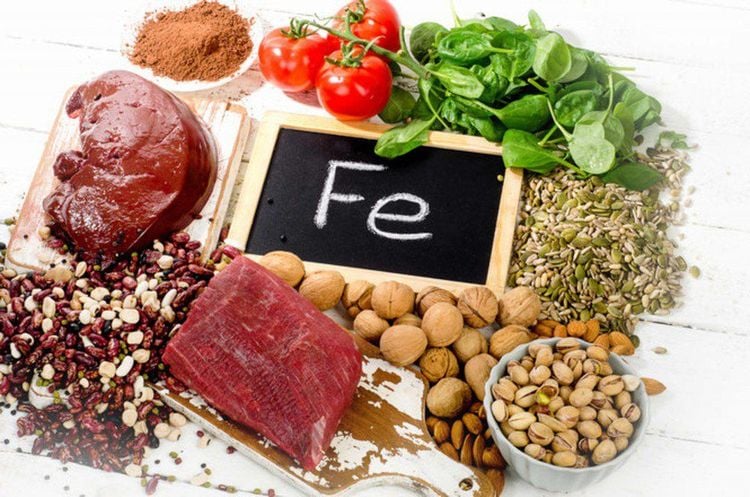
In addition, the weight level of pregnant women also changed significantly compared to the previous weight. Pregnant women who are underweight will be encouraged to try to gain more weight, while overweight women will need to limit their weight gain.
On the other hand, women's bodies also tend to absorb more iron more efficiently than before, and blood volume also increases during pregnancy. Therefore, they will need more iron supplements to ensure adequate oxygen requirements for both mother and fetus.
Trắc nghiệm: Chế độ dinh dưỡng 3 tháng đầu thai kỳ của mẹ bầu như thế nào?
3 tháng đầu được coi là giai đoạn phát triển quan trọng nhất của thai nhi. Để phát triển toàn diện, thai nhi cần được cung cấp đầy đủ dưỡng chất, đặc biệt là các vi chất cần thiết. Làm bài trắc nghiệm dưới đây sẽ giúp bạn có thêm kiến thức về chế độ dinh dưỡng trong 3 tháng đầu thai kỳ.The following content is prepared under supervision of Bác sĩ chuyên khoa I, Lê Hồng Liên , Sản phụ khoa , Khoa Sản phụ khoa - Bệnh viện Đa khoa Quốc tế Vinmec Central Park
2. Rules of nutrition for pregnant women
As mentioned above, pregnant women should follow a diet that is both varied, balanced and nutritious. This usually includes:
Fruits and vegetables: Pregnant women should eat about five servings of fruits and vegetables each day. You can use them flexibly in a variety of forms, such as liquid, dried, frozen, fresh or canned fruit. In particular, fruits and vegetables that are fresh or frozen immediately after picking often provide large amounts of vitamins and other essential nutrients. However, nutritionists recommend that pregnant women should eat fresh fruit better than drinking juice, because fruit juices are often very high in natural sugar. Foods high in starchy carbohydrates: Include rice, pasta, potatoes or bread. These foods provide a lot of energy, which is essential for a nutritious diet for pregnant women. Protein: Pregnant women can provide protein for their bodies through foods of animal origin, such as lean meat, fish, chicken and eggs. In addition, several other foods are also rich in protein, including quinoa, beans, tofu, soy products, lentils, seeds and nuts. Fat: Pregnant women should not consume too much fat in their daily diet as it can put the fetus at high risk of developing diabetes in the future. Pregnant women should choose healthy fats such as monounsaturated fats or omega-3s to promote the health of both mother and baby during pregnancy. Foods that are high in monounsaturated fats, such as peanut oil, olive oil, sesame oil, sunflower oil, canola oil, seeds or avocados. Fiber: Found in whole grain foods, legumes, vegetables, and fruits. Adding more fiber in the daily diet will help pregnant women reduce the risk of constipation and hemorrhoids. Calcium: This is also an indispensable nutrient for pregnant women. You can get calcium through foods like yogurt, milk, calcium-fortified soy milk, cheese, tofu, cabbage, broccoli, broccoli, beans, soybeans or kale.
Zinc: Is an important trace element, helps the body to grow and develop normally, and protects cells and participates in a number of other biological functions such as protein synthesis and nucleic acid metabolism. Therefore, this is an extremely important mineral for the development of the fetus in the womb. Pregnant women should supplement their body with zinc through the following foods: Turkey, chicken, shrimp, oysters, crab, ham, fish, meat, dairy products, peanut butter, beans, nuts, ginger, onions, wheat germ, bran, cereals, pasta, eggs, lentils, tofu and sunflower seeds.
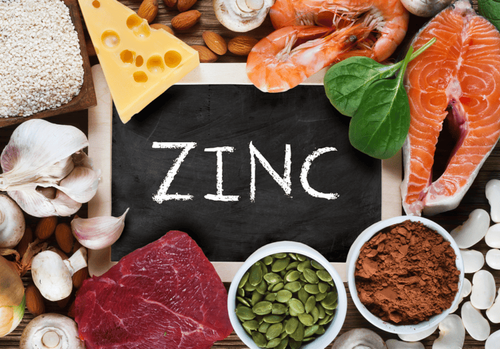
3. What vegetables should be eaten during pregnancy?
During pregnancy, a healthy and balanced diet is crucial for the health of both mother and baby. Researchers say that it is best for pregnant women to choose the right foods, eat them in the right quantities and at the right time. Any unhealthy choice can have an adverse effect and lead to serious complications for you and your unborn baby.
A healthy diet with lots of vegetables will help you effectively prevent the complications of nutritional deficiencies and gestational diabetes, because they contain a lot of essential vitamins such as vitamin C, beta carotene, folic acid and fiber. Moreover, consuming more vegetables also helps the baby to develop a healthy weight after birth, while reducing the risk of anemia, helping the mother to control her weight and blood pressure well.
Here are some vegetables that pregnant women should eat more often in their daily diet:
Sweet potatoes: Helps provide extremely rich vitamins A, B and C Bell peppers: Contains many fiber and vitamins Beets: Provides a large amount of vitamins and fiber, helps strengthen the immune system Green beans: Very rich in vitamins C and K, as well as fiber Broccoli: Provides a large amount of vitamin C, K and folate. It is also very helpful in relieving constipation. Dark green leafy vegetables: High in fiber, folate and carotenoids Parsley: High in vitamin E, protein and riboflavin Tomatoes: Rich in vitamins C, K and biotin.
4. How many vegetables should pregnant women eat?
Pregnant women will often feel more hungry than usual, because at this time, the fetus needs to be provided with adequate nutrients for healthy and rapid development. Ideally, pregnant women should divide meals into several portions to limit hunger. In addition, regular eating of small meals also helps to reduce digestive problems, which is a very common symptom during pregnancy. You should avoid consuming pre-canned vegetables, instead opting for vegetables that are in season.
Every day, you should eat from 2.5 to 3 cups (about 500 grams) of vegetables in raw or cooked form. In fact, vegetables are an extremely rich source of energy, they are also high in fiber, vitamins and minerals. Many people use vitamin supplements, but they cannot replace vegetables because supplements cannot meet the fiber needs of your body. In addition to eating healthy, pregnant women should also exercise regularly and pay attention to their rest times.
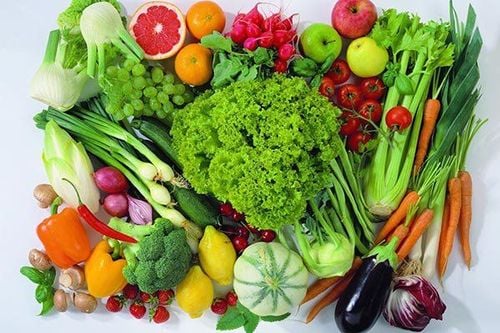
5. The best fruits that you should eat during pregnancy
Regular eating of fruit is a best measure to help pregnant women increase the absorption of vitamins into the body and limit sugar cravings. Here are some fruits that you should add to your diet:
Apricots: Contains a lot of vitamins A, C, E, and important minerals such as iron, calcium, potassium, phosphorus , beta carotene and silicon. All these nutrients are very helpful for the growth and development of the fetus. In addition, iron is a mineral that helps prevent anemia, while calcium helps strengthen teeth and bones. Oranges: This is an excellent source of vitamin C, water, and folate. It helps to keep the body of pregnant women full of water and healthy. In addition, the abundant amount of vitamin C in oranges also helps prevent cell damage and supports the body's absorption of iron. Meanwhile, folate is a mineral that helps prevent neural tube defects, which can lead to brain and spinal cord abnormalities in children. Mango: Very rich in vitamins A and C. One cup of mango can provide about 100% of the recommended daily amount of vitamin C (RDA) and more than 1/3 of the RDA of vitamin A for a person. Babies born with vitamin A deficiency often have weak immune systems and are prone to postpartum complications such as respiratory infections. Pears: Rich in fiber, folate, and potassium. Adding more fiber to your pregnancy diet will help relieve constipation. At the same time, potassium helps stimulate cell regeneration and promote cardiovascular health for both mother and baby. Pomegranate: Provides pregnant women with calcium, vitamin K, iron, folate, protein and fiber. This is really a good source of energy, helping to maintain strong bones because it contains a large amount of vitamin K. In addition, drinking pomegranate juice also helps reduce the risk of placental damage. Banana: Contains a large amount of vitamin C, vitamin B6, fiber and potassium. Some studies have shown that vitamin B6 found in bananas helps reduce nausea and vomiting during early pregnancy. Apples: Contains many nutrients that help the developing fetus, including vitamins A and C, fiber and potassium. Eating apples during pregnancy will help reduce the risk of asthma and allergies in the fetus.
6. How much fruit should pregnant women eat?
Pregnant women should eat at least five servings of fresh fruits and vegetables every day. As a general rule, a serving of fruit usually includes:
One cup of chopped fruit One piece of fruit (if the fruit is bigger than a tennis ball). Regular consumption of fruits and vegetables during pregnancy will provide pregnant women with adequate nutrients to support healthy fetal development. In addition, it also helps reduce the risk of some diseases and nourishes the woman's body.
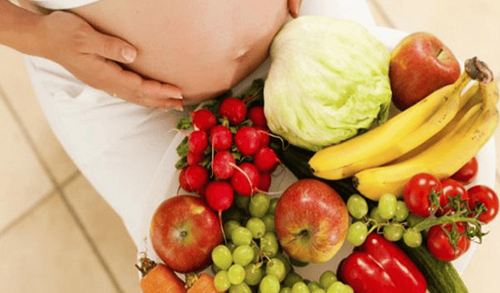
7.Foods to avoid during pregnancy
Ideally, pregnant women should avoid using the following foods:
Fish containing a lot of mercury: Including swordfish, shark and marlin. Undercooked or undercooked meat: Certain types of undercooked shellfish carry a very high risk of viral or bacterial contamination, which can lead to food poisoning. When you consume these foods, you can unknowingly allow harmful bacteria to cross the placenta and harm your unborn baby. Raw eggs: You should avoid eating raw eggs because it can be contaminated with salmonella. Processed foods: Can cause dangerous infectious disease (listeriosis). Pate: Any meat or vegetable pate can be contaminated with listeria, which is harmful to the health of mother and baby. Foods with Empty Calories: Like chips, cakes, cookies, and candy. You should limit eating them because these foods often contain high amounts of sugar and fat. Any questions that need to be answered by a specialist doctor as well as customers wishing to be examined and treated at Vinmec International General Hospital, please contact the Website for the best service.
Please dial HOTLINE for more information or register for an appointment HERE. Download MyVinmec app to make appointments faster and to manage your bookings easily.
References: healthline.com, parenting.firstcry.com, medicalnewstoday.com




